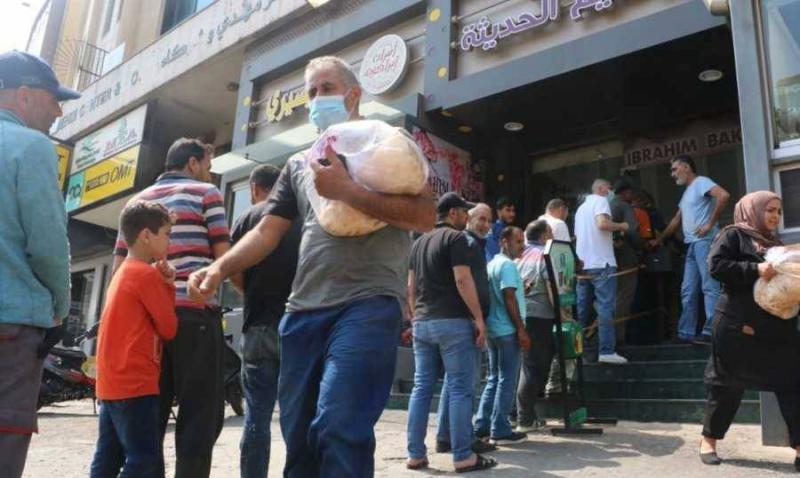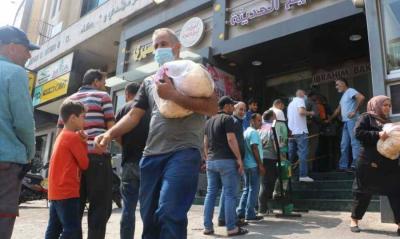The bread crisis will continue as long as the support remains in place, expected until around April of next year, because the issue is not the availability of quantities of wheat or subsidized flour, but rather the flawed support concept that the Lebanese state has adopted since the onset of the financial crisis, which has drained and wasted its funds in favor of traders, smugglers, and black market lords.
Minister of Economy Amin Salam stated that after nine months, support for flour will be lifted, and the price of a bread bundle could reach 30,000 Lebanese pounds, pointing out that the agreement with the World Bank is to end flour subsidies, while providing financial cards for poor families to purchase bread. Since most services and goods have now been priced in dollars and fully deregulated—such as fuels, medicines, communications, and foodstuffs—despite becoming unaffordable for a large segment of citizens, the excuse of securing a living for the poor to continue subsidizing bread is no longer logical, as the majority of the Lebanese people are now classified as poor, and the state has shown little concern before considering lifting support on various essential goods, foremost of which are medicines and healthcare. Thus, supporting wheat only benefits mills and bakeries, some of which have preferred to sell their allocations of subsidized wheat or flour at black market prices rather than go through the trouble of producing subsidized bread and making quick profits without production. Furthermore, support has only served smugglers who have opened a line to smuggle subsidized bread to Syria at black market prices, profiting at the expense of the "poor," for whom bread is no longer the only concern as their purchasing power has decreased by over 95%.
Although employees in the public sector, military, security forces, retirees, and a large section of private sector employees continue to receive their salaries at the fixed exchange rate of 1500 pounds, no one has questioned how they will manage to buy medicine, enter hospitals, pay bills for communications and generators, cover transportation costs that have seen lifted support, or even buy food supplies.
Accordingly, Lebanese people are asking the same question: "Why are we still discussing bread? Just remove the support and secure us bread!"
If the recently approved World Bank loan aims to continue support for nine months, those involved seem to have learned nothing from the waste and theft of support funds throughout the past period, and they are ready to waste another 150 million dollars to support goods—not citizens—meaning to support traders and smugglers rather than the needy.
In this context, sources from the Ministry of Economy clarified that the World Bank loan will be used to purchase wheat, and they will not rely on Lebanon's entitlements from the Special Drawing Rights (SDRs) at the IMF as they currently do. They noted that within six to seven months of using the loan funds, work will be done on the financial card issue until the support is lifted. They mentioned that 15 million dollars out of the total loan value of 150 million dollars will be a grant used to train the Directorate General of Grains and Sugar Beets in the necessary technical training, and a tracking system will be adopted to monitor the mechanism of distributing subsidized flour through the loan.
For his part, the head of the bakers' syndicate, Ali Ibrahim, questioned through "Al-Jumhuriya": "Didn't the minister consider that lifting bread support was a crime? What happened today? Why has he changed his mind?" He pointed out that "the World Bank loan for wheat, which amounts to 150 million dollars, covers nine months of our wheat needs, and therefore they decided to lift support afterward." He indicated that "bakeries are not receiving their specified flour allocations daily, as some mills are closed and others are on the verge of closing, and thus bakeries that receive their share produce bread, but if they do not receive it, they do not produce, as they have no stock. We have requested the minister to determine the stock of mills and issue them vouchers specifying which bakeries will be supplied with flour, but the response was that the ministry cannot determine the flour stock at the mills, even though it is the entity supplying them with subsidized wheat, which is absurd! On what basis are vouchers being distributed to us if they do not know the amount of flour at the mills?"
Ibrahim revealed that the bread shortage in the markets stems from a decrease in production volume due to the closure of some major mills and their failure to deliver flour to bakeries. He pointed out that bakeries used to receive 28,000 tons of flour monthly, but last month they received 24,000 tons, causing a shortage in the market and a bread crisis! He clarified that the quantity may be even less this month!




